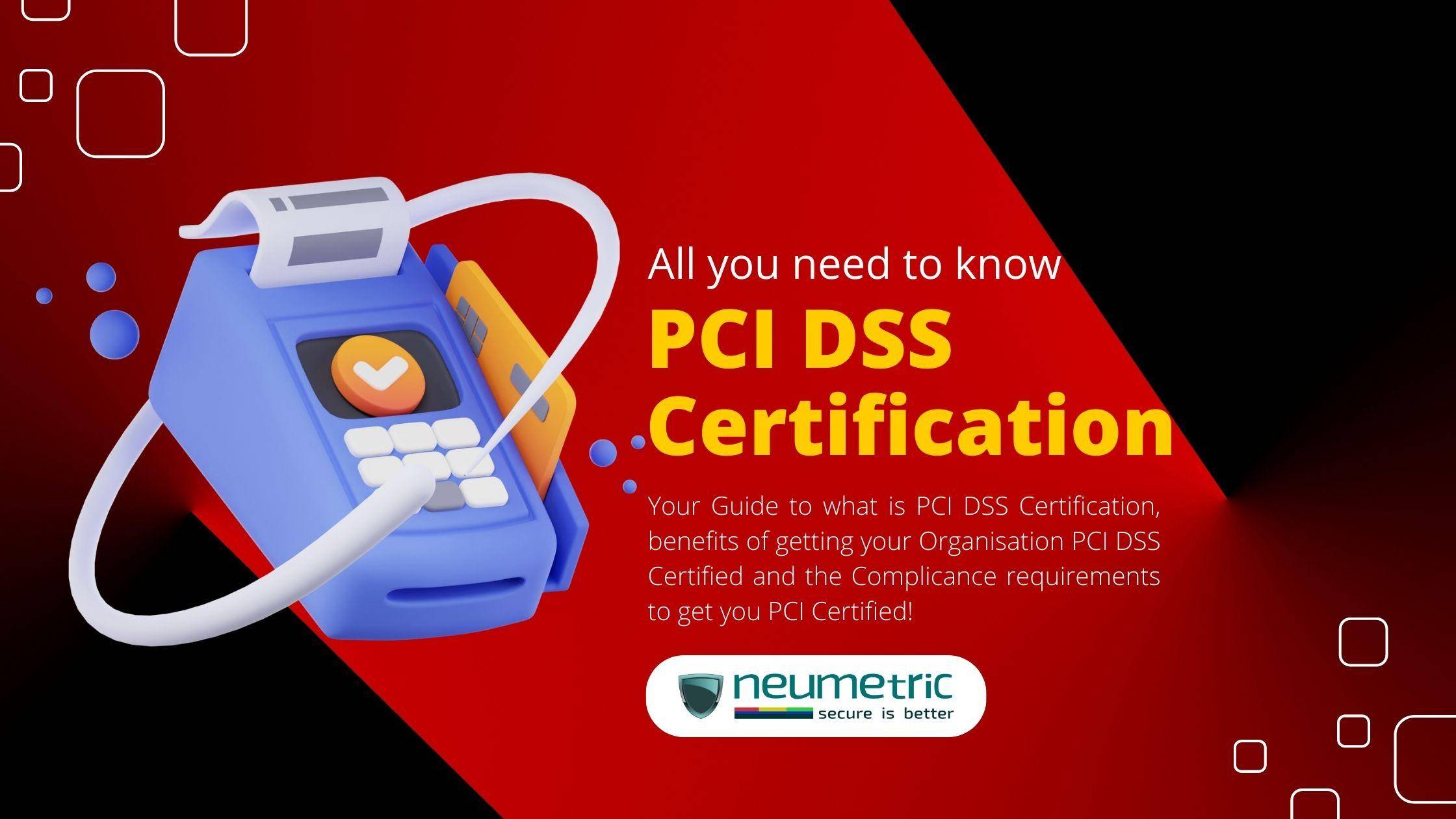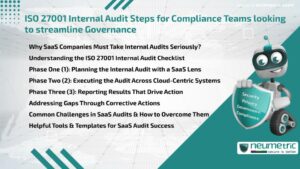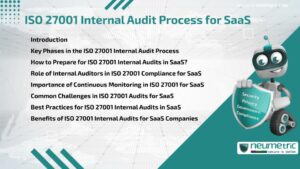Table of Contents
ToggleIntroduction
The Payment Card Industry Data Security Standard [PCI DSS] is a set of Security Standards designed to ensure that all Companies that accept, process, store or transmit credit card information maintain a secure environment. Obtaining PCI DSS Certification is a must for any Organisation that wants to assure their customers that their sensitive financial information is being handled with the highest level of security.
In this blog, we will explore all the important aspects of PCI DSS Certification, from what it is and why it’s necessary, to the steps involved in obtaining it, and the ongoing responsibilities of maintaining compliance. Whether you’re an executive, security professional, or just curious about the topic, this blog will provide you with all the information you need to know about PCI DSS Certification.
What is PCI DSS?
PCI DSS stands for Payment Card Industry Data Security Standard which is a set of requirements and guidelines that are designed to ensure that Companies who accept, process or store credit card information maintain a secure environment. The Standard was created by the PCI Security Standards Council (which is composed of American Express, Discover Financial Services, JCB International Ltd., MasterCard Worldwide and Visa Inc.) in 2006 after they recognized the need for better security standards in this area.
The goal of PCI DSS is to reduce fraud at all stages of card processing so you can keep your Business running smoothly while minimising your risk exposure as much as possible. The standard covers 12 requirements that must be met by all merchants accepting credit card payments, regardless of their size or the number of transactions they process. The PCI DSS requirements are organised into six Categories which are outlined further below.
Obtaining PCI DSS Certification is not mandatory, but it is highly recommended for all Companies that accept credit card payments. Failing to meet the standard can result in hefty fines and damage to a Company’s reputation, making PCI DSS an important investment in protecting sensitive financial information.
Benefits of PCI DSS Certification
Obtaining a PCI DSS Certification brings numerous benefits to Organisations that accept, process, store, or transmit credit card information. Some of the most significant benefits include:
- Increased Customer trust: By demonstrating a commitment to security and data protection, Companies can increase Customer trust and confidence in their Brand. This can lead to increased Customer loyalty and repeat business.
- Improved security posture: PCI DSS Certification requires Organisations to follow strict security standards and best practices, which can help improve their overall security posture and reduce the risk of a data breach.
- Compliance with industry standards: PCI DSS is an industry standard recognized by major credit card brands, including Visa, Mastercard, American Express, and others. Obtaining Certification helps Organisations comply with these standards and demonstrates their commitment to security and data protection.
- Reduced risk of data breaches: Following the requirements of PCI DSS can help reduce the risk of data breaches and the associated financial losses and damage to reputation.
- Better preparedness for Audits and Regulatory Compliance: Organisations that are PCI DSS Certified are better prepared for Audits and other Regulatory Compliance requirements, such as the General Data Protection Regulation [GDPR] in the European Union [EU].
- Improved risk management: PCI DSS Certification helps Organisations implement and maintain a risk management framework, which can help reduce the risk of security incidents and data breaches.
- Increased business opportunities: Some Organisations may require their partners and suppliers to be PCI DSS Certified before they do business with them. Obtaining Certification can open up new business opportunities and increase revenue potential.
Obtaining PCI DSS Certification is an investment in a Company’s security and reputation. By following the Standard’s requirements, Organisations can demonstrate their commitment to protecting sensitive financial information and gain the trust of their Customers, Partners, and Suppliers.
PCI DSS Certification Requirements
To become PCI DSS certified, Organisations must meet a set of requirements designed to ensure the protection of sensitive financial information. The requirements are divided into six categories, and Organisations must comply with all of them to achieve Certification.
- Build and maintain a Secure Network: This category requires Organisations to secure their network and systems, including installing and maintaining firewalls, protecting stored data, and implementing secure access controls.
- Protect Cardholder Data: This category requires Organisations to store and protect credit card information, including the use of encryption and secure methods for transmitting data.
- Maintain a Vulnerability Management Program: Organisations must regularly assess and address any vulnerabilities in their systems, such as outdated software or weak passwords.
- Implement Strong Access Control Measures: This category requires Organisations to establish Policies and Procedures for controlling access to Cardholder Data, including restricting access to only those who need it.
- Regularly Monitor and Test Networks: Organisations must regularly monitor and test their systems for potential security breaches, such as intrusion detection and penetration testing.
- Maintain an Information Security Policy: Organisations must develop and implement a comprehensive Information Security Policy, including regular training for employees on security best practices.
In addition to these requirements, Organisations must also complete a Self-Assessment Questionnaire [SAQ] and, in some cases, undergo a security assessment performed by a Qualified Security Assessor [QSA]. The level of assessment required will depend on the size of the Organisation and the volume of credit card transactions processed.
Organisations that are able to demonstrate Compliance with the PCI DSS requirements will receive Certification and will be listed on the PCI Security Standards Council’s website. Certification must be renewed annually and Organisations must continue to comply with the Standards to maintain their Certification.
Obtaining PCI DSS Certification requires Organisations to implement and maintain a comprehensive security framework, including network and system security, data protection, and risk management. By following these requirements, Organisations can demonstrate their commitment to protecting sensitive financial information and gain the trust of their customers, partners, and suppliers.
PCI DSS Compliance levels
The Payment Card Industry Data Security Standard [PCI DSS] is designed to ensure the protection of sensitive financial information and has different levels of Compliance, depending on the volume of credit card transactions processed by an Organisation. The four levels of PCI DSS compliance are:
- Level 1: Organisations that process over 6 million transactions annually are classified as Level 1 and must undergo a full security assessment by a Qualified Security Assessor [QSA] at least once a year. They must also provide additional documentation and evidence of their security posture.
- Level 2: Organisations that process between 1 and 6 million transactions annually are classified as Level 2 and must also undergo a full security assessment by a QSA, but at least once every three years.
- Level 3: Organisations that process between 20,000 and 1 million transactions annually are classified as Level 3 and must complete a Self-Assessment Questionnaire [SAQ] and provide evidence of Compliance.
- Level 4: Organisations that process fewer than 20,000 transactions annually are classified as Level 4 and must also complete an SAQ, but are subject to less rigorous requirements compared to higher levels.
It is important to note that regardless of the compliance level, all Organisations must follow the same PCI DSS requirements and must demonstrate compliance to protect sensitive financial information. Additionally, Organisations that process transactions through a third-party service provider, such as a payment gateway, must also ensure that their service provider is PCI DSS compliant.
The PCI DSS compliance levels are designed to recognize the varying levels of risk posed by different types of Organisations, with more stringent requirements for those processing higher volumes of transactions. By following the standards, Organisations can demonstrate their commitment to protecting sensitive financial information and gain the trust of their customers, partners, and suppliers.
Conclusion
The PCI DSS Certification is a must-have for any company that handles credit card data. It will help you comply with the Standards and make sure that your customers’ data is safe from any kind of cyber attacks. The Certification process may seem complicated at first, but if you follow our guide above and have all required documents ready then it should not take too long before you receive your Certificate back from an approved vendor.
Neumetric, a cybersecurity products and services Organisation, can help you obtain PCI DSS Certification for your Organisation. We create the necessary Policies and Procedures and implement them in your Organisation to ensure that you comply with the PCI DSS Standards. We also provide you with a PCI DSS Assessment Report and perform periodic Security Audits of your networks to make sure that any vulnerabilities are addressed immediately. Neumetric also performs Risk Assessments and conducts Employee awareness training to make sure that your Employees know how to handle a data breach and what their responsibilities are.
FAQs:
How do I become a PCI DSS certified?
You need to go through a PCI DSS Certification process. The first step is to make sure that your Company is eligible for the Certification, then you can apply for it with an approved Vendor. You will have to provide all necessary documents and undergo an Audit by a QSA expert.
Who can certify PCI DSS?
You can be Certified by any third-party approved by the PCI Security Standards Council. This includes QSA Experts, Security Assessors and Auditors.
How much does PCI DSS Certification cost?
This depends on your Company size, industry type and other factors. However, a rough estimate is around $5000 – $8000 per year for small businesses with less than 100 employees.
Is PCI DSS free?
No, it is not. You will have to pay a fee for the annual Certification. This can be anywhere between $5000 – $8000 per year depending on your Company size and industry type.





